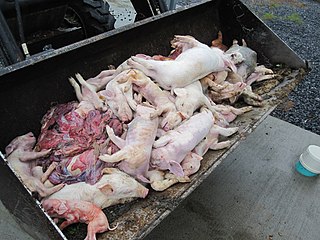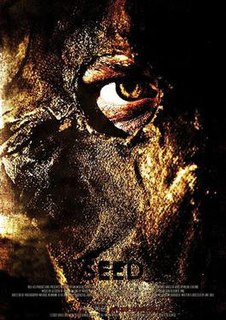 W
WPeople for the Ethical Treatment of Animals is an American animal rights organization based in Norfolk, Virginia, and led by Ingrid Newkirk, its international president. The nonprofit corporation claims 6.5 million supporters. Its slogan is "Animals are not ours to experiment on, eat, wear, use for entertainment, or abuse in any other way."
 W
WSeveral writers, including Jewish Nobel Prize laureate Isaac Bashevis Singer, and animal rights groups have drawn a comparison between the treatment of animals and the Holocaust. The comparison began immediately after the end of World War II, when Jewish writers recounted the lack of resistance by European Jewish victims of the Holocaust, who were led to their death as "sheep to slaughter". The comparison is regarded as controversial, and has been criticized by organizations that campaign against antisemitism, including the Anti-Defamation League (ADL) and the United States Holocaust Memorial Museum.
 W
WI Am an Animal: The Story of Ingrid Newkirk and PETA was a 2007 documentary about Ingrid Newkirk, co-founder of People for the Ethical Treatment of Animals (PETA), and her crusade for animal rights. It premiered on November 19, 2007 on HBO. Production credits include Matthew Galkin, Sheila Nevins, Steven Cantor (producer), and Mikaela Beardsley (producer).
 W
WMeet Your Meat is a 2002 documentary about factory farming created by People for the Ethical Treatment of Animals (PETA), narrated by Alec Baldwin, and directed by Bruce Friedrich and Cem Akin. The documentary explores the treatment of animals in modern animal agriculture. The film runs 12 minutes long.
 W
WAlexander Fernando Pacheco is an American animal rights activist. He is the founder of 600 Million Dogs, co-founder and former chairman of People for the Ethical Treatment of Animals (PETA) and a member of the advisory board of the Sea Shepherd Conservation Society.
 W
WPeople for the Ethical Treatment of Animals v. Doughney, 263 F.3d 359, was an important Internet domain trademark infringement decision by the United States Court of Appeals for the Fourth Circuit.
 W
WPeople for the Ethical Treatment of Animals (PETA), an animal rights organization based in the United States, has released a number of browser games on its website that have parodied existing video games. Various PETA parodies have been made based on games such as New Super Mario Bros., Cooking Mama 2: World Kitchen, New Super Mario Bros. Wii, Super Meat Boy, Super Mario 3D Land, Pokémon Black And White 2, and Pokémon X and Y. PETA creates these games to spread attention about real-life animal rights and animal welfare concerns and to advocate for vegetarian and vegan diets.
 W
WThe Running of the Nudes, like the well-known Running of the Bulls, takes place in Pamplona, Spain. The Running of the Nudes occurs two days before the Running of the Bulls, just before the start of the nine-day festival of San Fermín. The event was created in 2002 and is supported by animal welfare groups, including PETA, who object to the Running of the Bulls, claiming that the event is cruel and glorifies bullfighting, which the groups oppose. In the Running of the Nudes, naked humans, many wearing only plastic horns and red scarves, follow the same route taken by the Running of the Bulls, from the Santo Domingo corrals through the town’s streets, ending at the Plaza de Toros. The length of the run is some 800 metres and the event takes about one hour.
 W
WSeed is a 2007 Canadian horror film written, produced, and directed by Uwe Boll. Filming ran from July 17 to August 11, 2006 in British Columbia, Canada, on a $10 million budget.
 W
WThe Silver Spring monkeys were 17 wild-born macaque monkeys from the Philippines who were kept in the Institute for Behavioral Research in Silver Spring, Maryland. From 1981 until 1991, they became what one writer called the most famous lab animals in history, as a result of a battle between animal researchers, animal advocates, politicians, and the courts over whether to use them in research or release them to a sanctuary. Within the scientific community, the monkeys became known for their use in experiments into neuroplasticity—the ability of the adult primate brain to reorganize itself.